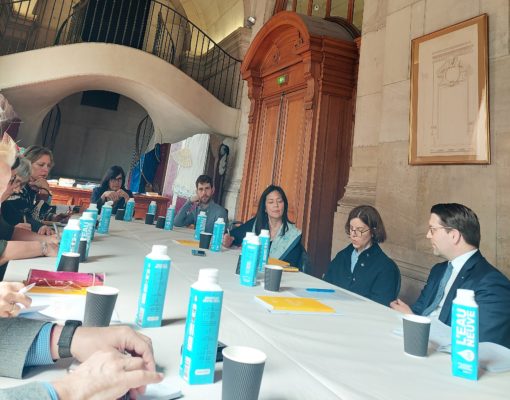 Paris Opera General Director Alexander Neef has clear ideas about all issues affecting opera, ballet and the arts in general, except for one: artificial intelligence. Like much of the world, he is in “awe and terror” of it, he told 16 members of the AAPA at an on-the-record meeting in Palais Garnier May 4.
Paris Opera General Director Alexander Neef has clear ideas about all issues affecting opera, ballet and the arts in general, except for one: artificial intelligence. Like much of the world, he is in “awe and terror” of it, he told 16 members of the AAPA at an on-the-record meeting in Palais Garnier May 4.
Neef’s biggest challenge since arriving at the three years ago of the National Opera de Paris National three years ago, he said, has been “getting out of Covid.” He was referring to the numerous efforts to re-open theaters safely, only to have to close them again between March 2020 and September 2021, when both the Palais Garnier and Opera Bastille were once again fully operational.
Now, Neef and his team are dealing with the changing post-Covid economic model for the two houses in its domain. Government subsidies are one example. In 2008, when Neef was casting director in Paris, government support represented 65% of budget. Today, they represent only 40% of the annual €240 million at his disposal. The rest comes from ticket sales (of which there were none during Covid closures) and various marketing and sales efforts. Added to budget concerns is pressure from inflation. Energy costs alone consume some €30 million a year.
Pension reform upheavals in France have had no impact on the company. It has its own separate retirement regime. Dancers, for example, retire at 42. Many don’t make it that far. “It is very, very rare for a dancer aged 40 to 42 to be able to do a 3-act ballet,” said Neef. Moreover, the pace is more hectic than that of any regional opera house in France, with an annual 180 performances each of opera and ballet in the Bastille and Garnier houses.
Audiences have returned in force since the middle of last year. American and other tourists play an important part of that, accounting for some 20% of the seats sold. The average age of Paris audiences is 45, compared to an average of 56 for Europe as a whole. This, said Neef, is probably due to the tourists, the presence of several universities in the French capital, and the fact that the Paris Opera is an “anchor” in the community.
He stressed the new season’s “panorama” of operas and ballets, ranging from the traditional to the avant-garde, noting it is just as important for artists to want to perform in cutting-edge productions as it is for audiences to want to watch them. The star system, however, has had its day. “Gone is the time when tickets for stars like Luciano Pavarotti would sell out in minutes,” said Neef. Star salaries are no longer as high. The top end of the scale at the Paris Opera is €16,000 per performance, “and that hasn’t changed in the past ten years,” said Neef.
Pragmatism is a key for him, as is the need to show that “the door is open,” and to help new opera-goers come in. But the success of summer music festivals could be a threat in the long run if they lead to the collapse of regional houses as these develop the talent on which Paris can draw eventually.
Social media puts cultural institutions in direct contact with the public, enabling them to bypass the press, but the disadvantages, Neel opines, are fake news and “everyone considering themselves to be a critic.”
Asked about so-called cancel culture, he said Rigoletto is now seen as a metoo# opera. “No change to the original version is needed,” he said. “The message was already there, —abuse of power — so it was just a question of ‘reading’ it.” The same reasoning applies to other classics, he added.
Turning to Russian performers and the war in Ukraine, Neef said it was a case-by-case issue and noted that a Ukrainian performer in Paris turned down his offer to display a Ukrainian flag on stage in Paris when the war broke out, for fear of endangering their family in Ukraine.
Neef appeared perplexed by the demand of the heirs of Jules-Eugène Lenepveu (painter of the original ceiling of the Palais Garnier grande salle) to remove Marc Chagall’s huge floating ceiling in order to reveal Lenepveu’s work, hidden since Chagall’s painting was unveiled in 1964. We would need to build a museum to house it, Neef said. “I don’t think it will come down any time soon.”
